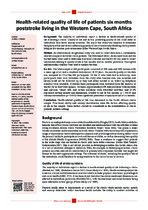Health-related quality of life of patients six months poststroke living in the Western Cape, South Africa
Abstract
BACKGROUND: The majority of individuals report a decline in health-related quality of life following a stroke. Quality of life and factors predicting quality of life could differ in individuals from lower income countries. The aim of this study was therefore to determine the quality of life and factors influencing quality of life of community-dwelling stroke patients living in low-income, peri-urban areas in the Western Cape, South Africa.
METHOD: An observational, longitudinal study was used to collect data from a conveniently selected sample of first-ever stroke patients. The Rivermead Motor Assessment Scale and the Barthel Index were used to determine functional outcome and the EQ-5D was used to collect information relating to quality of life at two months and six months poststroke. Descriptive and inferential statistics were used to analyse the data.
RESULTS: The total sample of 100 participants consisted of 50% men and 50% women with a mean age of 61 and a standard deviation of 10.55 years. Six-month quality of life datawas analysed for 73 of the 100 participants. Of the 27 who were lost to follow-up, nine participants died, four withdrew from the study after baseline data was collected and eleven could not be followed up as they had either moved or no follow-up telephone numbers were available. A further three participants were excluded from the analysis of the EQ-5D as they were aphasic. Of these, approximately 35% had problems with mobility and self-care, whilst 42% had severe problems with everyday activities and 37.8% expressed having anxiety and depression. Quality of life at two months (p = 0.010) and urinary incontinence (p = 0.002) were significant predictors of quality of life at six months.
CONCLUSION: Health-related quality of life was decreased in the South African stroke sample. Functional ability and urinary incontinence were the factors affecting quality of life in the sample. These factors should be considered in the rehabilitation of stroke patients in these settings.

